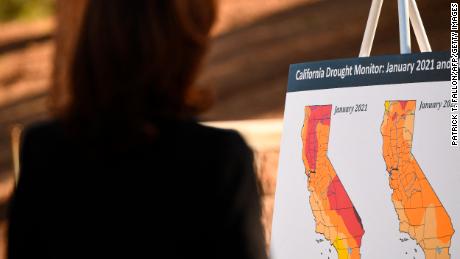The annual Gallup “Mood of the Nation” poll, which was conducted from January 3 to 16, found most Americans — 73% — were not satisfied with the US government’s energy policies. It also found only 39% of Americans were satisfied with the quality of environment in the US.
Both figures were the lowest they’ve been since Gallup began surveying Americans on those questions in 2001.
From high gas prices to climate crisis concerns, here’s what’s behind the numbers, according to experts.
Gas prices drive dissatisfaction
Gas prices have surged as travel and transportation mostly recovered after the pandemic initially wiped them out, and supply is having a hard time keeping up with the increase in demand. The average price of gas in the US is currently around $3.38 a gallon, according to AAA.
Dan Klein, an energy analyst for S&P Global Platts, told CNN he thinks the low satisfaction on energy policy is mostly the result of these high prices.
“Filling up the gas tank is the most regular and quantifiable place where Americans interact with energy costs, and where they may form opinions about policymakers and about energy policies,” said Klein.
But gas prices may not fully explain Americans’ dissatisfaction, Klein said, as some people — particularly younger Americans who are more concerned about climate change — could also be unhappy with Congress for so far failing to pass the clean energy measures in President Joe Biden’s climate and economic package.
The poll is a “painful reminder” to the Biden administration that voter sentiments “are still very much tied to short-term economic issues, like prices at the pump,” Klein said.
“The administration has both announced policies that would reduce domestic oil demand over the long term, and asked OPEC to produce more oil in the short term,” Klein said. “This shows how policymakers have to walk a fine line between keeping fossil fuel prices low and offering policy pathways on the energy transition.”
Leah Stokes, a senior policy advisor at Evergreen and professor of political science at the University of California, Santa Barbara, said even though public opinion is shifting and more people see the need for clean energy, we still live in a world beholden to gas.
“People obviously need to be able to afford to get around, to drive to work, but right now they’re relying on gas, which is a really volatile, dirty fuel,” Stokes said.
Meaningful clean energy policies that would help with electrification — swapping gas appliances for electric and increasing the number of electric vehicles on the road — would help Americans break out of the systemic grip of fossil fuel, Stokes said.
“We don’t have to keep using fossil fuels,” Stokes said. “When we do that, we’re not stuck with these volatile energy prices that people are frustrated with. I think that’s the way out of the puzzle.”
The partisan divide
Gallup’s data shows stark partisan splits on the environment and energy, with Democrats more dissatisfied with the quality of the environment than Republicans, and Republicans more concerned about energy policies.
The largest drop in satisfaction — 45 points — around the government’s energy policy was among Republican respondents, among which satisfaction plunged from 68% in 2021 to 23% in 2022.
Lydia Saad, director of US social research at Gallup, told CNN that over the last decade, Republican dissatisfaction with energy policy in the poll strongly correlates with the average price of gasoline in the previous December.
“At the same time, Democrats have tended to be more dissatisfied than Republicans with energy policy, but they are just not as reactive to gas prices,” she said.
Stokes pointed out the bigger drop in satisfaction among Republicans is not surprising given Democrats’ unified control of Congress and the White House.
Gallup’s question on satisfaction with the environment also revealed a massive partisan split: 56% of Republicans said they were satisfied with the quality of the environment, while just 27% of Democrats said the same. Meanwhile, 38% of independents said they were satisfied with the environment.
Saad said the numbers for Democrats could reflect lingering bad feelings about Trump-era policies, but Congress’ lack of action on Biden’s climate and economic bill could also be suppressing their satisfaction.
Jonathon Schuldt, the interim Executive Director of the Roper Center for Public Opinion Research at Cornell University, said the shift in opinion on climate change could also play a role in low satisfaction on environmental quality.
For example, the Yale Program on Climate Change Communication found in September 2021 that more people are alarmed about the climate crisis than ever.
“It’s important to keep in mind other polling trends that might be part of the story,” Schuldt told CNN. “Surveys show that record numbers of Americans are worried about climate change, which may be contributing to dissatisfaction about environmental quality.”







